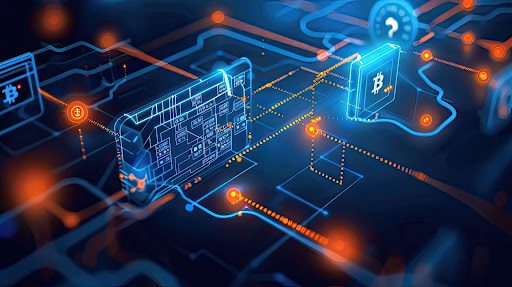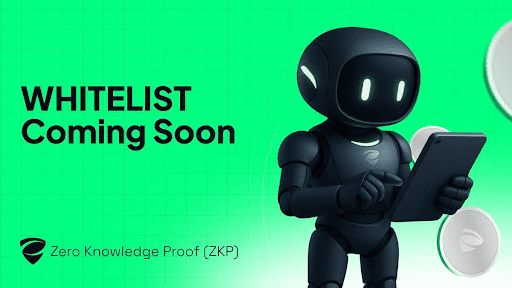Zero Knowledge Proof (ZKP) is stepping into the spotlight as one of the most anticipated blockchain launches on the horizon. Positioned at the intersection of artificial intelligence and decentralized networks, it promises a new way to handle data, security, and fairness in digital ecosystems. By addressing the challenges of trust and scalability, it aims to solve problems that centralized systems have failed to manage.
The whitelist, which will be opening soon, has already generated buzz among those following blockchain prelaunch projects. Many see it as more than just another token event. Instead, it is being viewed as a rare chance to participate in a project that combines privacy with verifiable computation. For those asking what is zero knowledge proof and why it matters, Zero Knowledge Proof (ZKP) is emerging as a practical answer backed by a presale model that has caught attention.
A New Model for AI and Blockchain
Artificial intelligence demands massive computing power and enormous datasets. Traditional systems are controlled by a few large players, which limits access and creates bottlenecks. Zero Knowledge Proof (ZKP) addresses this by distributing both computation and storage across a wide network of participants. Instead of relying on centralized servers, Zero Knowledge Proof (ZKP) spreads the workload across many nodes, creating efficiency and resilience.
What makes this unique is that contributors are rewarded fairly for their role in keeping the network running. Whether they provide computing power or storage, participants gain recognition for their input. This creates a merit-based system, designed to be transparent and trustworthy. It also ensures that power and control are not concentrated in a single place.
For potential participants, this is part of the excitement around the whitelist. Many view it as an entry point into a project that could grow into the next 100x crypto presale. By combining AI demand with blockchain fairness, Zero Knowledge Proof (ZKP) makes a strong case as a project worth watching closely.
Privacy, Ownership, and Trust
Beyond performance, one of the strongest appeals of Zero Knowledge Proof (ZKP) is privacy. In centralized environments, personal or business data is often collected, shared, or even exposed without consent. Zero Knowledge Proof (ZKP) challenges this by making sure contributors keep ownership of their data while still proving it can be used effectively.
This is made possible through cryptographic methods that allow verification without disclosure. In practice, this means sensitive details remain hidden, yet the system can still trust that they are valid. For example, an AI model can confirm it is trained on the right type of data without exposing the actual dataset. This is a breakthrough for those asking what is zero knowledge proof and how it benefits real-world use cases.
The importance of this cannot be understated. As demand for privacy-first systems grows worldwide, projects like Zero Knowledge Proof (ZKP) are well-positioned. By protecting data sovereignty and ensuring contributors remain in control, it builds trust in a way that many older networks cannot. This trust is why many expect the whitelist to attract strong interest as Zero Knowledge Proof (ZKP) positions itself as a leading upcoming crypto presale.
The Whitelist Opportunity
The buzz around the whitelist comes from one simple fact: early entry points are rare. By the time most projects reach mainstream attention, the best opportunities are often gone. With Zero Knowledge Proof (ZKP), the whitelist represents a chance to participate before the market catches up to its potential.
Part of this anticipation is tied to Zero Knowledge Proof (ZKP)’s ability to handle the major challenges of scalability and security. Its design is built to avoid bottlenecks and single points of failure, while still ensuring speed and integrity. By combining AI workloads with decentralized verification, it addresses a demand that few other projects are tackling head-on.
For many, this positions Zero Knowledge Proof (ZKP) as more than just an experiment. It has the hallmarks of a project built for the long run, with both privacy and fairness at its core. This is why its prelaunch phase and whitelist have become so widely discussed.
The combination of advanced cryptography with a fair participation model is drawing attention across the blockchain space.
Closing Analysis
Zero Knowledge Proof (ZKP) is entering its prelaunch phase with strong momentum. By uniting AI compute, data privacy, and fair rewards, it addresses some of the biggest challenges facing digital systems today. For those still asking what is zero knowledge proof, this project shows how it can be applied to create trust and scalability in real-world applications.
The whitelist coming soon has become the central focus. For many, it represents a gateway into what could be the next 100x crypto presale. As interest builds, the message is clear: opportunities like this do not come often. Zero Knowledge Proof (ZKP) has positioned itself not only as an upcoming crypto presale, but as one that could shape the next chapter of blockchain adoption.
Find Out More At:





































